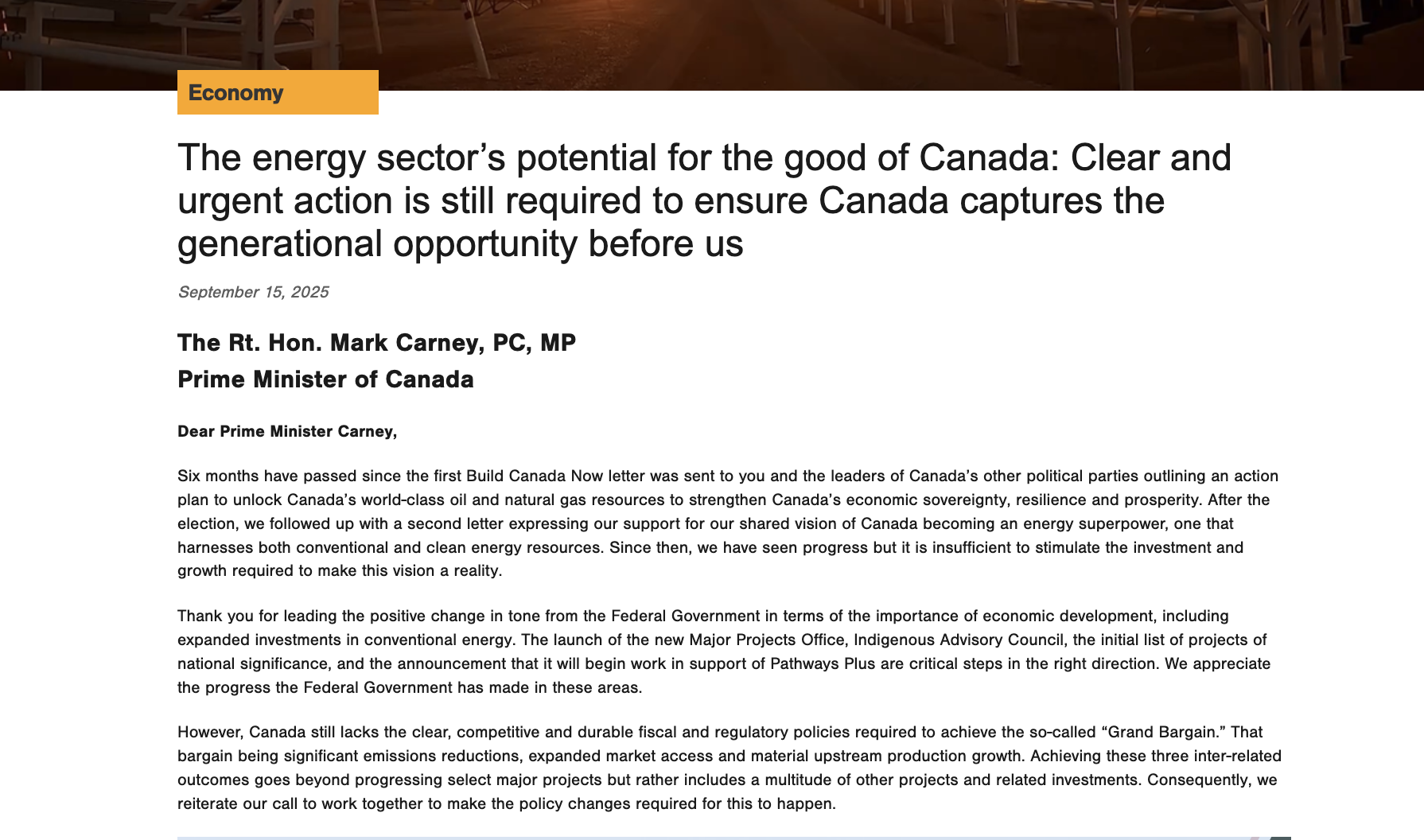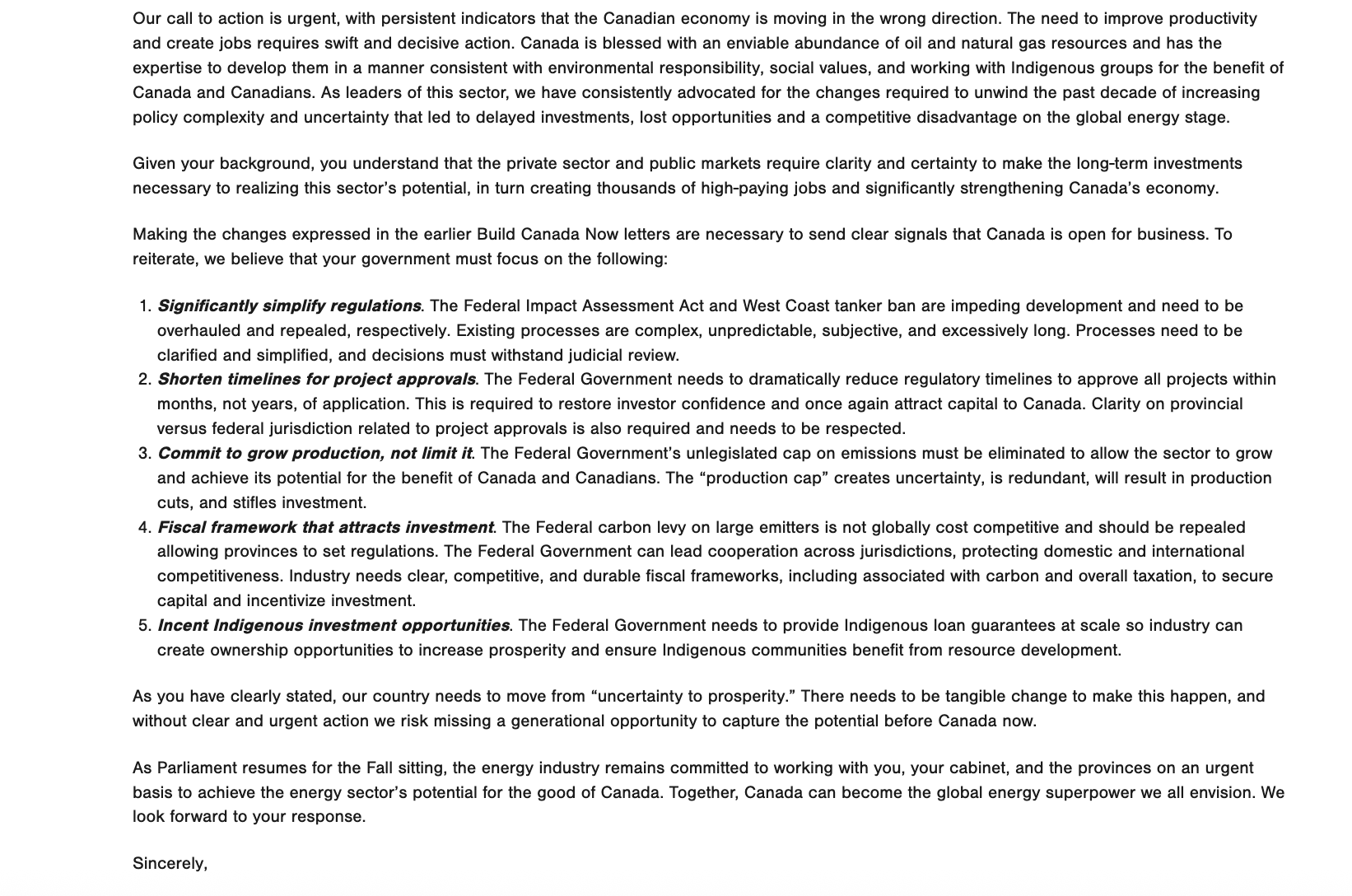Canada’s business leaders are sounding the alarm. 📢
96 of the country’s top CEOs have signed a letter titled Build Canada Now, warning Prime Minister Mark Carney that the national economy is “moving in the wrong direction.” The message is clear: without urgent changes, Canada risks falling behind on investment, competitiveness, and long-term prosperity.
💸 Rising Costs for Canadians
Many households are already under financial strain:
Mortgage renewals have increased by $1,200–$1,800 per month for many families 🏠
Heating bills are up by around 20% 🔥
Grocery costs remain elevated 🥦🥩
Insurance and fuel continue to rise ⛽
The Bank of Canada recently cut its key interest rate by 0.25%, bringing it to 2.5% — the first cut in 6 months, and the lowest in 3 years. 📉
However, for those who locked in mortgages at 2% during the pandemic, renewals are still nearly double that rate, leaving many Canadians struggling to adjust.
Data shows that households are devoting a large share of income to housing:
Low-income households spend between 31%–36% of disposable income on shelter
1 in 3 renters spend more than 30% of income just to keep a roof overhead 🏚️
This leaves little room for saving, investing, or contributing to productivity growth.
📑 What the CEOs Are Proposing
The CEOs outlined a 5-point plan to improve Canada’s competitiveness and investment climate. They are calling for:
⚡ Simplified regulation
⚡ Faster project approvals
⚡ Commitment to grow production
⚡ Repeal of the federal carbon levy
⚡ Large-scale Indigenous loan guarantees
The letter argues that Canada is losing ground compared to the United States and Europe, where projects are being approved faster and investment is flowing more easily.

🌍 The Mark Carney Factor
Prime Minister Mark Carney is not a traditional politician. His background includes:
Former Governor of the Bank of Canada
Former Governor of the Bank of England
Former UN Special Envoy on Climate Action and Finance 🌍💼
Carney has long supported carbon pricing, climate-related regulation, and global financial coordination. The CEOs’ demands — such as scrapping the emissions cap and repealing the carbon levy — are in direct tension with much of his past work.
This sets up a significant policy crossroads: whether Canada doubles down on regulation and climate commitments, or pivots toward deregulation and faster growth.
⚖️ Competing Visions
This letter highlights a clear divide:
Corporate leaders argue that regulation, delays, and levies are driving investment away, stalling housing, and reducing competitiveness.
Carney’s track record shows strong support for emissions caps, carbon pricing, and frameworks that align Canada with global climate finance goals.
Both approaches have trade-offs:
Deregulation may speed up projects and attract investment, but could weaken climate commitments.
Maintaining caps and levies may support long-term sustainability, but risks higher costs and slower growth.

🏚️ What’s at Stake for Canadians
The implications for everyday Canadians are significant:
Housing affordability: With mortgage rates still high and housing costs consuming large portions of income, ownership is becoming less attainable.
Economic productivity: With so much income going to housing, less is left for savings, consumption, or investment.
Social stability: Rising costs can strain households and communities, contributing to social and economic tension.
Some observers warn that, without change, Canada risks a shrinking middle class and growing dependency on rentals and corporate housing. Others see opportunities in new models such as 15-minute cities, though critics worry these could limit mobility if affordability continues to decline.
📊 Broader Economic Pressures
The CEOs’ letter comes at a time when:
Inflation has moderated but remains above target 📈
Wage growth is not keeping up with rising living costs 💵
Canada’s productivity levels lag behind peer countries ⚙️
Global investors are favoring markets with faster approval processes and lower regulatory barriers 🌍
All of this compounds pressure on households and raises questions about Canada’s future economic path.
✅ Key Takeaways
96 CEOs have issued a public warning that Canada’s economy is moving in the wrong direction.
Their 5-point plan calls for deregulation, faster approvals, growth, repeal of the carbon levy, and Indigenous loan guarantees.
Prime Minister Mark Carney’s track record — carbon pricing, climate finance, and regulatory frameworks — is in sharp contrast with these demands.
The outcome will directly affect Canadians, from mortgages and housing affordability to jobs, productivity, and long-term stability.
🗣️ Final Word
Canada stands at a crossroads. The next steps from Ottawa — whether aligning with the CEOs’ demands, continuing on Carney’s regulatory path, or finding a middle ground — will shape not just policy, but the daily lives of millions of Canadians.
The debate is no longer theoretical. It’s about mortgages, food bills, jobs, and the future of the middle class.

